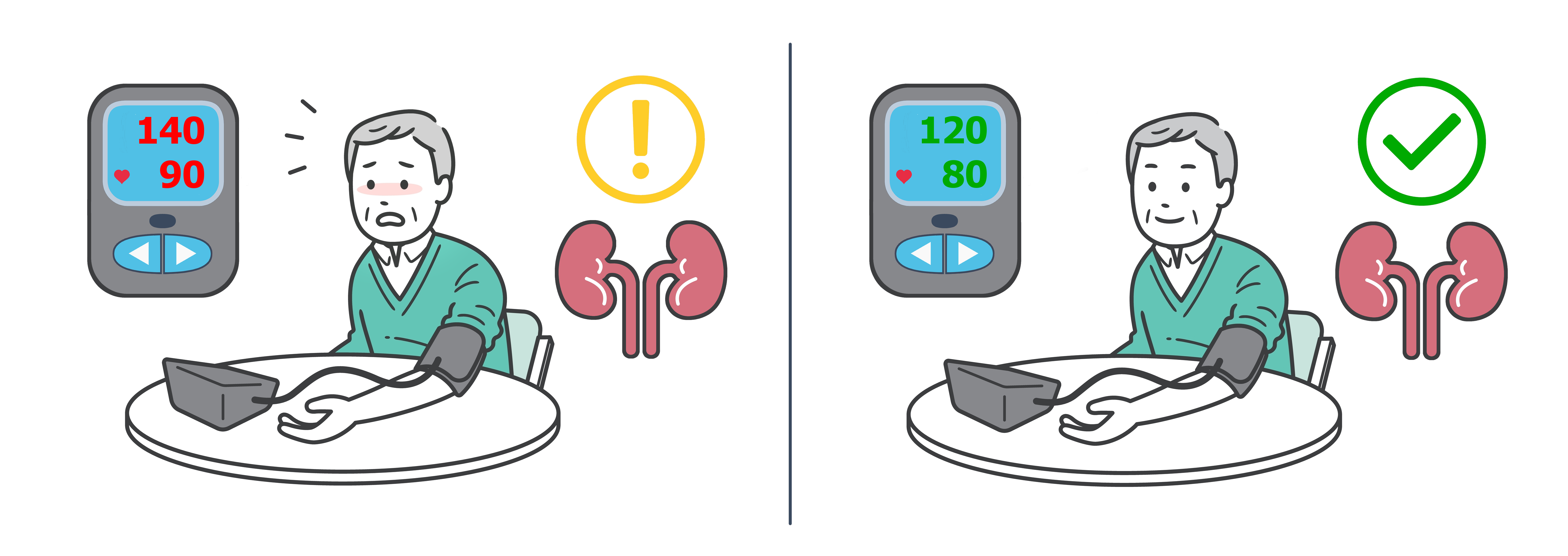A number of studies have demonstrated that people with high blood pressure (BP) are at increased risk of developing kidney damage, chronic kidney disease (CKD), and end-stage renal disease (ESRD).1-8 Some studies have demonstrated a linear relationship between BP and CKD with systolic blood pressure (SBP) having higher significance than diastolic blood pressure (DBP).3,4,6,7 Experts hypothesize that elevated systemic BP can be transmitted to and damage the glomerulus, the basic filtration unit of the kidney, contributing to progressive kidney disease.
Multiple large cohort studies have evaluated the effects of BP on kidney function. One study looked at 43,305 patients with a diagnosis of hypertension and no pre-existing CKD at Kaiser Permanente Colorado.1 Baseline SBP was significantly higher among those who went on to develop CKD (138 vs 132 mmHg, adjusted Hazard Ratio [HR] 1.06, Confidence Interval [CI] [1.04-1.08], p<0.01). Over seven years of follow-up, average SBP was also significantly higher among those who developed CKD (135.7 vs 131.7 mmHg, p<0.01). The variance of SBP over time was also found to be a significant determinant of the development of CKD. The cumulative incidence of CKD was relatively similar between those with a SBP variance of 60-122 and 122-132 mmHg (20.4% and 22.1%, respectively) but was higher for 132-142 (22.5%) and ≥142 mmHg (28.3%).
A longitudinal study conducted from 1978-2001 of participants without kidney disease (n=2,585) assessed risk factors for developing kidney disease across an average of 18.5 years.2 Upon follow-up, 244 people (9.4%) had developed kidney disease, defined as having a glomerular filtration rate (GFR) of 59.25 mL/min per 1.73 m2 for women and 64.25 mL/min per 1.73 m2 for men. Using stepwise logistic regression analysis, the authors determined significant risk factors for the development of kidney disease. Among those with hypertension at baseline, 17.9% went on to develop kidney disease compared to 7.4% of those without hypertension (Odds Ratio [OR] 1.57, 95% CI [1.17-2.12]).
A 2002 prospective analysis of 2,181 participants in the Systolic Hypertension in the Elderly Program (SHEP) found that SBP had the largest risk for declining kidney function.3 Over five years of follow-up, 226 participants had kidney damage as determined by an increase in serum creatine ≥0.4 mg/dL. The incidence of kidney decline was 19.0 per 1,000 person-years for those with a SBP of 158-163 and 45.3 per 1,000 person-years for a SBP of 176-213 mmHg (Relative Risk [RR] 2.44, 95% CI [1.67-3.56], p<0.001).
A prospective observational study on a predominantly white community in Maryland examined risk factors for the development of CKD.4 Of the 23,534 participants, 143 developed CKD over 20 years. The incidence of CKD was 0.08 among those with optimal BP (<120/80 mmHg), 0.21% for suboptimal BP (SBP 120-129 or DBP 80-84 mmHg), 0.47% for pre-hypertension (SBP 130-139 or DBP 85-89 mmHg), 0.69% for mild hypertension (SBP 140-159 or DBP 90-99 mmHg), 1.75% for moderate (SBP 160-179 or DBP 100-109 mmHg), and 2.60% for severe (SBP ≥180 or DBP ≥110 mmHg).
A 1996 analysis of 332,544 patients from the Multiple Risk Factor Intervention Trial assessed the risk of developing ESRD.5 Over an average of 16 years of follow-up, 814 patients developed ESRD, 49% of which had hypertension at baseline. The incidence of ESRD was 0.083% among those with optimal BP (<120/80 mmHg), 0.12% for suboptimal BP (SBP 120-129 or DBP 80-84 mmHg), 0.18% for pre-hypertension (SBP 130-139 or DBP 85-89 mmHg), 0.32% for mild hypertension (SBP 140-159 or DBP 90-99 mmHg), 0.67% for moderate (SBP 160-179 or DBP 100-109 mmHg), 1.33% for severe (SBP 180-209 and DBP 110-119 mmHg), and 2.58% for patients with very severe hypertension (SBP ≥210 or DBP ≥120 mmHg).
Because renal disease can lead to hypertension,9 a prospective study (n=316,675) of data gathered from 1964-1985 sought to screen out underlying baseline kidney disease when assessing risk factors for the development of ESRD.6 Acceptance criteria included a normal GFR of ≥60 mL/min per 1.73 m2 and negative dipstick urinalyses at baseline to rule out early renal disease. Over 21 years of follow-up, 1,149 developed ESRD with 74.9% of those cases having elevated BP at baseline (SBP ≥130 or DBP ≥85 mmHg), suggesting that BP is an independent risk factor for the development of ESRD. The incidence of ERSD was 0.12% among those with optimal BP (mean 109/66 mmHg), 0.25% for normal but not optimal BP (mean 122/73 mmHg), 0.34% for high normal (mean 132/77 mmHg), 0.55% for mild hypertension (mean 143/83 mmHg), 0.93% for moderate (mean 161/92 mmHg), 1.1% for severe (mean 177/101 mmHg), and 1.3% for very severe (mean 189/122 mmHg).
For patients who already have CKD, there is no consensus recommendation on ideal BP levels. A 2017 study found that after 3.3 years of maintaining SBP levels at either <120 mmHg (n=1,330) or <140 mmHg (n=1,316) had no effect on CKD outcome or kidney decline.10 Clinical practice guidelines from Kidney Disease – Improving Global Outcomes (KDIGO) recommend managing hypertension in patients with CKD to manage cardiovascular disease risk but do not issue a recommendation regarding target BP.9
References
- Hanratty R, Chonchol M, Havranek EP, et al. Relationship between blood pressure and incident chronic kidney disease in hypertensive patients. Clin J Am Soc Nephrol. Nov 2011;6(11):2605-11. doi:10.2215/cjn.02240311
- Fox CS, Larson MG, Leip EP, Culleton B, Wilson PW, Levy D. Predictors of new-onset kidney disease in a community-based population. Jama. Feb 18 2004;291(7):844-50. doi:10.1001/jama.291.7.844
- Young JH, Klag MJ, Muntner P, Whyte JL, Pahor M, Coresh J. Blood pressure and decline in kidney function: findings from the Systolic Hypertension in the Elderly Program (SHEP). J Am Soc Nephrol. Nov 2002;13(11):2776-82. doi:10.1097/01.asn.0000031805.09178.37
- Haroun MK, Jaar BG, Hoffman SC, Comstock GW, Klag MJ, Coresh J. Risk factors for chronic kidney disease: a prospective study of 23,534 men and women in Washington County, Maryland. J Am Soc Nephrol. Nov 2003;14(11):2934-41. doi:10.1097/01.asn.0000095249.99803.85
- Klag MJ, Whelton PK, Randall BL, et al. Blood pressure and end-stage renal disease in men. N Engl J Med. Jan 4 1996;334(1):13-8. doi:10.1056/nejm199601043340103
- Hsu CY, McCulloch CE, Darbinian J, Go AS, Iribarren C. Elevated blood pressure and risk of end-stage renal disease in subjects without baseline kidney disease. Arch Intern Med. Apr 25 2005;165(8):923-8. doi:10.1001/archinte.165.8.923
- Iseki K, Iseki C, Ikemiya Y, Fukiyama K. Risk of developing end-stage renal disease in a cohort of mass screening. Kidney Int. Mar 1996;49(3):800-5. doi:10.1038/ki.1996.111
- Tozawa M, Iseki K, Iseki C, Kinjo K, Ikemiya Y, Takishita S. Blood pressure predicts risk of developing end-stage renal disease in men and women. Hypertension. Jun 2003;41(6):1341-5. doi:10.1161/01.hyp.0000069699.92349.8c
- KDIGO 2024 Clinical Practice Guideline for the Evaluation and Management of Chronic Kidney Disease. Kidney Int. Apr 2024;105(4s):S117-s314. doi:10.1016/j.kint.2023.10.018
- Cheung AK, Rahman M, Reboussin DM, et al. Effects of Intensive BP Control in CKD. J Am Soc Nephrol. Sep 2017;28(9):2812-2823. doi:10.1681/asn.2017020148



